Advertisement
other useful stuff ... of historical interest ... classic UK demountables
Scroll down the page or click to jump to any of the following brands:
• Margrove • Multicruiser • PRV Wildmoor • Romahome • Suntrekker • Tandy •
Margrove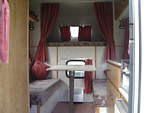 The Margrove was a small motorhome on a one-tonne pickup chassis built in either a fixed form, as the 'Fairway', or in demountable form as the 'Freeway'. Both the fixed and demountable versions shared the same rear entrance and internal layout - still typical of many demountables.
The Margrove was a small motorhome on a one-tonne pickup chassis built in either a fixed form, as the 'Fairway', or in demountable form as the 'Freeway'. Both the fixed and demountable versions shared the same rear entrance and internal layout - still typical of many demountables.
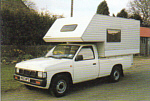 Produced in Middlesborough by Margrove Caravans & Motorhomes, they were manufactured during the latter half of the 1980s and the early years of the 1990s. They were only ever built in very small numbers and consequently are now extremely rare. Margrove Caravans & Motorhomes still exists as a dealership but, as far as I know, they are no longer manufacturers. If you want to seek further information they are at Busby Grange, Great Busby, Middlesborough TS9 7AS Tel: 01642 710770.
Produced in Middlesborough by Margrove Caravans & Motorhomes, they were manufactured during the latter half of the 1980s and the early years of the 1990s. They were only ever built in very small numbers and consequently are now extremely rare. Margrove Caravans & Motorhomes still exists as a dealership but, as far as I know, they are no longer manufacturers. If you want to seek further information they are at Busby Grange, Great Busby, Middlesborough TS9 7AS Tel: 01642 710770.
TOP of the page
Multicruiser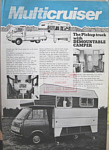
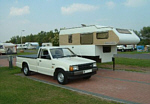 Multicruiser, based in Thornbury, Bradford, was first incorporated in 1975 and quickly established a reputation as a builder of coachbuilt motorhomes on the recently-imported Toyota Hi-Ace. In 1977 it produced its first demountable model for the contemporary Dodge 2500 light flatbed truck and continued production of one-off coachbuilt demountables for the newly-imported one-tonne pickups through the 1980s and into the early 1990s.
Multicruiser, based in Thornbury, Bradford, was first incorporated in 1975 and quickly established a reputation as a builder of coachbuilt motorhomes on the recently-imported Toyota Hi-Ace. In 1977 it produced its first demountable model for the contemporary Dodge 2500 light flatbed truck and continued production of one-off coachbuilt demountables for the newly-imported one-tonne pickups through the 1980s and into the early 1990s.
TOP of the page
PRV Wildmoor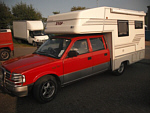 The 'Wildmoor' was an attempt by Profab Recreational Vehicles (PRV) to create a camper with a simpler mounting/demounting system than the normal, and sometimes precarious, four jacking legs. Rather like the German 'Bimobil' (see German manufacturers), it involved a complete rebuild of the back end of the pickup which, as far as I can recall, then had runners along which the camper was essentially 'winched' into position.
The 'Wildmoor' was an attempt by Profab Recreational Vehicles (PRV) to create a camper with a simpler mounting/demounting system than the normal, and sometimes precarious, four jacking legs. Rather like the German 'Bimobil' (see German manufacturers), it involved a complete rebuild of the back end of the pickup which, as far as I can recall, then had runners along which the camper was essentially 'winched' into position.
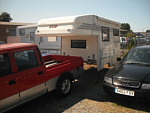 Inevitably rebuilding the pickup bed added significantly to the cost and so the Wildmoor was always an expensive demountable. Two other major drawbacks of this mounting/demounting system was that the usefulness of the pickup bed was severely compromised and the demountable camper unit could not be transferred to another pickup.
Inevitably rebuilding the pickup bed added significantly to the cost and so the Wildmoor was always an expensive demountable. Two other major drawbacks of this mounting/demounting system was that the usefulness of the pickup bed was severely compromised and the demountable camper unit could not be transferred to another pickup.
The Wildmoor was only produced for a very short time around the end of the 1990s/beginning of the 2000s. I'm not sure that PRV are still trading (I suspect they're not) but if you want to chase up further info or history, they used to be based in the West Midlands at C6 Earlswood Trading Estate, Poolhead Lane, Earlswood, Solihull B94 5EW Tel: 01564 703976.
TOP of the page
Romahome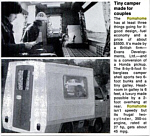 The fibreglass Romahome body for the tiny, 350c.c. Honda Acty was manufactured by Evans Developments (Portsmouth) Ltd. from 1978 onwards. Exploiting the company's boat-building expertise, the Romahome was the first UK demountable to utilise a monocoque construction technique (see types of demountable body if you're not sure what this means). From the outset the Romahome was intended for production line manufacture and was to be made available to the public through a network of dealerships - even in the USA (see Popular Mechanics article) - rather than direct from the factory. This was in direct contrast to the bespoke coachbuilding that other manufacturers at the time offered. Evans continued to produce, develop and improve the Romahome through the 1980s and into the 1990s fitting them not just to the Honda but to other 'micro' pickups such as the Daihatsu Hijet and the Bedford Rascal.
The fibreglass Romahome body for the tiny, 350c.c. Honda Acty was manufactured by Evans Developments (Portsmouth) Ltd. from 1978 onwards. Exploiting the company's boat-building expertise, the Romahome was the first UK demountable to utilise a monocoque construction technique (see types of demountable body if you're not sure what this means). From the outset the Romahome was intended for production line manufacture and was to be made available to the public through a network of dealerships - even in the USA (see Popular Mechanics article) - rather than direct from the factory. This was in direct contrast to the bespoke coachbuilding that other manufacturers at the time offered. Evans continued to produce, develop and improve the Romahome through the 1980s and into the 1990s fitting them not just to the Honda but to other 'micro' pickups such as the Daihatsu Hijet and the Bedford Rascal.
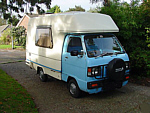 In 1993 Evans Developments moved its production to the Isle of Wight and changed its name to Island Plastics but continued to produce the Romahome and to develop its distinctive design. But the days of the demountable Romahome were limited. Although the size, quality and layout of the Romahome was extremely popular, in practice research showed that very few owners ever bothered to dismount the camper from the truck. In response Island Plastics shifted its attention and resources to production of the first of a long line (they are still in production today) of fixed-body Romahomes.
In 1993 Evans Developments moved its production to the Isle of Wight and changed its name to Island Plastics but continued to produce the Romahome and to develop its distinctive design. But the days of the demountable Romahome were limited. Although the size, quality and layout of the Romahome was extremely popular, in practice research showed that very few owners ever bothered to dismount the camper from the truck. In response Island Plastics shifted its attention and resources to production of the first of a long line (they are still in production today) of fixed-body Romahomes.
TOP of the page
Suntrekker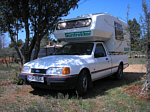 ICP Ltd. first produced demountables under the brand name of Suntrekker in the early 1970s for UK-manufactured Ford Transit and Bedford CF trucks. By the mid-70s however, UK production of chassis had virtually dried up due to continuing industrial disputes and, in frustration, ICP withdrew from the market and sold the Suntrekker business and brand to coachbuilders B.Walker & Son of Watford.
ICP Ltd. first produced demountables under the brand name of Suntrekker in the early 1970s for UK-manufactured Ford Transit and Bedford CF trucks. By the mid-70s however, UK production of chassis had virtually dried up due to continuing industrial disputes and, in frustration, ICP withdrew from the market and sold the Suntrekker business and brand to coachbuilders B.Walker & Son of Watford.
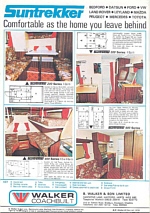
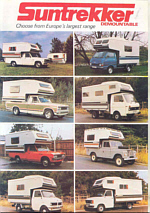 Walker's acquisition was timely and coincided with the first imports by Mazda and Datsun of one-tonne pickups from Japan. Their 1978 brochure shows the Suntrekker as a full range of demountables of all sizes to fit most contemporary pickups and light commercial flatbeds. They claimed that Suntrekker was "Europe's largest range" of demountables; it was certainly the largest in the U.K.
Walker's acquisition was timely and coincided with the first imports by Mazda and Datsun of one-tonne pickups from Japan. Their 1978 brochure shows the Suntrekker as a full range of demountables of all sizes to fit most contemporary pickups and light commercial flatbeds. They claimed that Suntrekker was "Europe's largest range" of demountables; it was certainly the largest in the U.K.
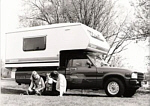 Import of vehicles from foreign manufacturers continued and by the end of 1981 pickups from Toyota, Daihatsu and Colt were all available in the UK to be followed in 1982 by Ford's import of the P100 from South Africa. Although in response to all these opportunities Walkers continued production of coachbuilt demountables (as the 1982 press release photograph of the Suntrekker on the new Toyota Hilux illustrates) they also had considerable experience at developing the use of glass-fibre in the construction of their very successful 'Truckman' hardtops and canopies for pickup beds (still in production today though under different ownership).
Import of vehicles from foreign manufacturers continued and by the end of 1981 pickups from Toyota, Daihatsu and Colt were all available in the UK to be followed in 1982 by Ford's import of the P100 from South Africa. Although in response to all these opportunities Walkers continued production of coachbuilt demountables (as the 1982 press release photograph of the Suntrekker on the new Toyota Hilux illustrates) they also had considerable experience at developing the use of glass-fibre in the construction of their very successful 'Truckman' hardtops and canopies for pickup beds (still in production today though under different ownership). 
 Before the decade was out they had extended this development into the first glass-fibre bodied 'Suntrekker 2', an obvious predecessor to the classic Island Plastics version of the 90s. Suntrekker Caravans dissolved in 1992 and sold the brand and business to Island Plastics. Island Plastic's production of the Suntrekker demountable stopped in 1996.
Before the decade was out they had extended this development into the first glass-fibre bodied 'Suntrekker 2', an obvious predecessor to the classic Island Plastics version of the 90s. Suntrekker Caravans dissolved in 1992 and sold the brand and business to Island Plastics. Island Plastic's production of the Suntrekker demountable stopped in 1996.
TOP of the page
Tandy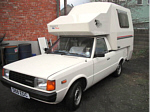 Tandy, based in Ryde on the Isle of Wight, emerged onto the motorcaravan market in the mid-1980s and were best known for their camper conversions of small vans and estate cars. (Surviving examples of their camper based on the Austin Maestro van are still highly cherished and sought after.) Tandy made just one excursion into the demountable market, the 'Pony', constructed for contemporary ½-tonne pickups such as the VW Caddy and, appropriately enough, the Hyundai Pony.
Tandy, based in Ryde on the Isle of Wight, emerged onto the motorcaravan market in the mid-1980s and were best known for their camper conversions of small vans and estate cars. (Surviving examples of their camper based on the Austin Maestro van are still highly cherished and sought after.) Tandy made just one excursion into the demountable market, the 'Pony', constructed for contemporary ½-tonne pickups such as the VW Caddy and, appropriately enough, the Hyundai Pony.
< BACK to 'of historical interest' • ^ TOP of the page
